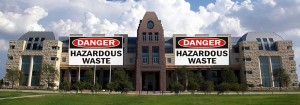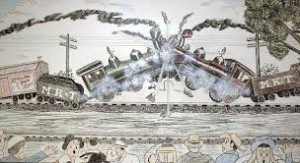Posts Tagged ‘Lead Contamination’
Morning News on Frisco: City Must Come Clean
 This editorial ran in Today's Dallas Morning News:
This editorial ran in Today's Dallas Morning News:
"Environmentalists and Frisco residents have long wondered whether contamination existed beyond the borders of Exide Technologies’ shuttered Frisco plant.
Now they know, thanks to recent open records requests from Frisco Unleaded and Downwinders at Risk to state environmental officials. Waste materials from battery recycling processes exist in the 340-acre Grand Park area, the proposed site of an elaborate regional park.
If you live in Frisco, you should be perturbed that you didn’t hear this sobering news sooner — or hear it from the city, which has known of these findings for a couple of months. Instead, the information comes from environmental groups that stumbled across the test results in the Texas Commission on Environmental Quality’s response to their records request.
Given the lingering controversy over the extent and pace of the cleanup of Exide’s plant site, city officials owed it to residents to disclose everything they knew as soon as they learned it. Governmental transparency and communication are important, especially when health, safety, property values and the credibility of cleanup efforts are at stake. This is important because the new reports detail problems on land outside of Exide’s property that need to be cleaned up.
City officials contend they’ve been open with residents and last Monday filed an application to include the Grand Park area in a state voluntary cleanup program.
The city has done itself no favors by sitting on information. Frustrated with the pace of the cleanup, environmental groups want the Environmental Protection Agency to issue an imminent and substantial endangerment order and take over cleanup from TCEQ, which they allege is moving too slowly. While that is unlikely, the complaint underscores the desire of residents and environmental groups to make sure the cleanup is done properly.
What Frisco residents want is what any resident of any community wants — assurances that land that could house levels of lead, cadmium and arsenic in excess of state benchmarks will be cleaned up. The best way to do that is for Frisco to make sure residents know what’s going on — even steps the city might think are minor and procedural. And if subsequent testing definitively links the broader contamination to Exide, then Frisco has to make sure the battery company, now in bankruptcy proceedings, will pay for the cleanup.
More than a year has passed since Exide and Frisco struck a landmark deal to shutter the battery recycler, a major step toward Frisco reclaiming industrial land for a cleaner environment and recreational purposes. Now Frisco must make sure that the area is free of potentially deadly contaminants and that residents are fully aware of the extent of contamination.
Frisco has an opportunity to use land for a grand community vision, but it has to deal openly and transparently with residents and make sure those responsible for the contamination clean up the mess they’ve made."
The Most Toxic Place in Frisco? City Hall
 There have been times and places when Frisco's official municipal insularity has undoubtedly worked in its favor. It's focused, "go-our-own-way" style is probably a big reason why the city has carved such a high-profile niche among DFW suburbs.
There have been times and places when Frisco's official municipal insularity has undoubtedly worked in its favor. It's focused, "go-our-own-way" style is probably a big reason why the city has carved such a high-profile niche among DFW suburbs.
But the last two years of wrestling with the Exide lead smelter has revealed all of the vices of such an approach when it comes to environmental hazards and public health.
Given the rapidity of events, it's easy to forget that only two years ago, the same city officials now in charge of pursuing a clean-up of the Exide site were lauding the smelter as a valuable member of the local business establishment and trying to find ways to keep it operating. Having a lead smelter spewing tons of toxic air pollution near the High School in the middle of town was OK with these folks. They'd overlooked decades of state and federal environmental violations by the smelter. They overlooked the destruction of a city water treatment plant by the smelter. Hey, Exide employed 100 people. And "what could the city do anyway?"
Only the intervention of citizens, campaigning with the well-known idea of the city being able amortize the facility out of existence, forced the city to finally confront the incongruity of the smelter's operation with its 2013 Frisco surroundings.
Frisco parents didn't sign their mortgages in blood to gain entry in a prized school district only to have their kids IQ suffer because of an obsolete lead smelter. To their credit city officials sensed that the curtain had been pulled back too far on their pretense to go on. They did a 180 and got the smelter out of town. But they did it the Frisco Way: the city manager and city attorney wrote a secret, complicated, $45 buy-out agreement with Exide that was passed by the Council without any public hearing and no debate.
After the unanimous vote, when someone asked Frisco Councilman John Keating if he'd support a community oversight committee to make sure we got the best clean-up of he smelter site, his response was "We're it." And just like that, it was supposed to all go away. Containment.
But lead smelters are messy places, especially outlaw operations like the one Frisco hosted for so long. Especially when they operate decades before most of the regulations governing them now were implemented or enforced. They're hard to contain unless you know what you're doing. And nobody could tell Frisco it didn't know what it was doing. It was Frisco!
The city didn't feel any obligation to let its residents know how it would handle the clean-up, how extensive the clean-up would be, what kind of technologies or strategies might be used. Perhaps most importantly of all though, city officials never asked themselves or their constituents the most basic of planning questions, "What's going to happen to the Exide site?"
The City's de facto answer seems to be: a toxic waste dump. It appears to be fine with letting Exide hold on to the core of the smelter property, where all the worst contamination is, where tons and tons of lead waste are buried or piled or dumped, all uphill from Stewart Creek that still runs right through the site. So amidst all the million-dollar homes and exclusive shopping malls there will be this large toxic no-man's land with scary warning signs and the need for continued monitoring for decades. City officials meet any skepticism of this plan with a shrug of their shoulders. "What can the City do?" For a town with a reputation for being "can-do." Frisco City Hall has lacked the imagination to see anything but the need for an extensive cover-up – literally and figuratively – when it comes to the Exide situation.
Instead of dealing straight-on with the challenge, officials decided to play a game of misdirection by emphasizing what a great new regional park it was building…..directly downstream of the still-contaminated smelter site. But please, mention of any current or potential contamination problems at these presentations by any city official is strictly prohibited. It's just so uncouth to keep bringing that up.
If you lived outside the bubble of Frisco City Hall, you could see the absurdity in this strategy. Putting a park downstream of a dirty Exide site is like putting puppies on the rail at the end of a roller coaster ride. You're just waiting for disaster to strike.
And it turns out those city officials knew it too. They just didn't want to tell their residents.
Six months before they signed that complicated $45 million secret deal, officials were aware there was extensive contamination of the Grand Park area by Exide. Maybe that's one reason they wanted to keep the agreement secret.
We've been told by more than one engineer that the City had a responsibility to turn over that information to the EPA and state when it got the results in November 2011. Instead it just sat on it. How many Frisco children have been needlessly exposed to hazardous material in and around Stewart Creek in the intervening 18 months? How could any Frisco official in good conscience keep this kind of thing from the public?
It took another year and a half for the City to follow-up with its "visual survey" of the entire 5-mile course of Stewart Creek, from the smelter to Lake Lewisville. Then, instead of taking equipment with them on that trip up the Creek that would be able to identify lead waste and give you some idea about its toxicity, including stuff you couldn't necessarily see at first glance, it was merely a sightseeing affair where "suspected" slag and chips that were out in the open were inventoried.
However, even that expedition was enough to confirm that the Creek had been acting as a sluice for Exide waste into the Lake. The City had those results three months ago.
All of this information was known in early June when Frisco Unleaded and Downwinders released a small report on the threat to Frisco's Grand Park from the smelter site. We did it at one of those Council presentations about the park where all of its virtues are discussed, but none of its environmental problems.
Not one city official spoke to the contamination problems facing the park. And it was clear that most were furious at citizens for once again raining on their Grand Park parade. It's as if Frisco city officials really believe that if you just don't mention the Exide toxic waste problem out loud, it can't hurt you.
It's one thing to apply that kind of magical thinking in denying Open Records Act requests and fluffing-up park presentations, but when it infects your ability to protect public health, it becomes a more serious matter.
Not only has the city hid information about hazardous materials that it had a duty to make public. It's been caught trying to actually hide the hazardous materials. When a TCEQ inspector advises the city in 2012 that there's a new pile of battery chips that's washed up, the city's response is to cover it up with "geo-membrane fabric" – even when the TCEQ inspector says that's not going to be sufficient. They don't want to dig it up. They don't want to do more testing to see the extent of contamination. They don't want to actually remove it. They want to cover it up. That's the city's entire M.O. when it comes to Exide these days. And that's what must change.
Had the city been up front with its own residents in real time about the smelter contamination, there would have been no press in June about how the smelter will impact Grand Park. The public would have already known. There would have been no wave of coverage about these City reports and TCEQ memo all of this last week. It would have been out in the open already. By trying to hide information from the public the city only insures it will always be in a reactive mode and behind the curve. It automatically gives more power to curious citizens to write the narrative, as this past month has shown. When your residents are finding this stuff out from us, instead of the local government that insists it's got everything under control, it's a sure sign that they don't have every thing under control
So far, only Frisco Unleaded and Downwinders have offered anything like a long-term answer to the most important question – what's going to happen to the Exide site? And we're even on the planning department's payroll.
But the City Manager, City Attorney and Mayor would all rather drink lye than admit they've been wrong about this problem, or that Frisco Unleaded might have a good idea or two. It's the toxic mix of arrogance, lack of vision, and conflict of interest that's doing the most to poison Frisco right now. Exide's messy waste problem is only a symptom of this kind of mind-set. Before the definitive clean-up can happen at Exide, there's got to be one at City Hall.
Latest Stop in Slo-Mo Exide Train Wreck: Thursday 5-7pm
 Coming down the hill from the west is a freight train full of woe for Exide. It's carrying at least five shareholder lawsuits aimed at the company for not disclosing its environmental liabilities, including those stemming from the operation of its Vernon, California smelter. That would be the same smelter California state officials shut down due to leaking lead waste and an unacceptable cancer risk to over 100,000 local residents. On board is a "restructuring specialist" who is supposed to see the company through its second bankruptcy in a decade. As of last week, Exide stock was selling for a cool 75 cents a share. The whole company is about to shoot off the rails.
Coming down the hill from the west is a freight train full of woe for Exide. It's carrying at least five shareholder lawsuits aimed at the company for not disclosing its environmental liabilities, including those stemming from the operation of its Vernon, California smelter. That would be the same smelter California state officials shut down due to leaking lead waste and an unacceptable cancer risk to over 100,000 local residents. On board is a "restructuring specialist" who is supposed to see the company through its second bankruptcy in a decade. As of last week, Exide stock was selling for a cool 75 cents a share. The whole company is about to shoot off the rails.
Meeting it head-on coming from the east is the Exide's smelter site in Frisco, over 100 acres and fifty years of sloppy handling and disposal of hazardous lead, arsenic, cadmium, dioxin and other poisons. There are "pre-RCRA" sites aplenty – meaning they were there before any regulations could catch up with them, as well as more recent disasters like the illegal burying of hazardous waste in a non-hazardous landfill. Just last week the City of Frisco released a preliminary environmental assessment of the LEAST-contaminated parts of the smelter that revealed new potential contamination as well as the fact that the entirety of Stewart Creek had been re-routed around the smelter in 1964 – leaving the original channel underneath the MOST contaminated part of the smelter. Moreover, even though the smelter closed in November of last year, it's been routinely causing high levels of lead air pollution from the demolition and closure operations going on.
Caught in the middle are Frisco residents who just want to live without a lot of lead in their air for awhile, and don't want to see a new Superfund Site in their town. The state's Texas Commission in Environmental Quality is in its usual "Yes Man" role to industry and seemingly finds no fault in any of Exide's plans to leave pits and landfills full of smelter waste in Frisco permanently. Having made its sweetheart deal to close the smelter, the City of Frisco has taken a back seat to the company and TCEQ when it's come time to figure out how best to clean-up the site.
Thursday night Exide is sponsoring another one of its "community meetings" in which the community is invited to come hear company representatives put nice spin on everything as well as duck questions about its financial responsibilities and long-term plans. It's no substitute for a real public meeting but its the only game in town for Frisco residents who don't want to see a toxic waste dump site remain downtown.
